Diabetes Awareness Month 2020
30
Nov
2020
November is Diabetes Awareness Month. Diabetes is a chronic disease that requires support from various professions. Our staff and resources support the needs of patients living with prediabetes or diabetes through our Diabetes Education Centre. The centre supports patients through one-on-one or group consultation regarding medication, monitoring blood sugar levels, healthy living, exercise, and other lifestyle choices.
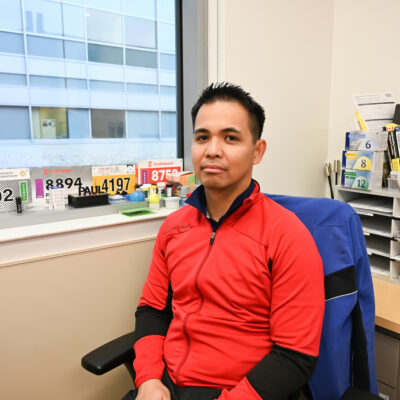 Diabetes Education Centre
Diabetes Education Centre
We offer individual visits (in person and via phone) and virtual group sessions to assist patients in managing their blood sugars. Some of the topics discussed with patients include:
- Eating well
- Food label reading
- Understanding your medications (including insulin)
- Preventing diabetes complications and managing other risk factors of diabetes
- The use of blood glucose meters
At the Diabetes in Pregnancy Education Clinic, the Diabetes Education Centre also works closely with our Endocrinologists to assist pregnant patients with diabetes or gestational diabetes managing their blood sugars. Both individual sessions (in person and via phone) and virtual group sessions are offered. Teleophthalmology services are also offered at the Diabetes Education Centre, which provides retinal screening for patients.
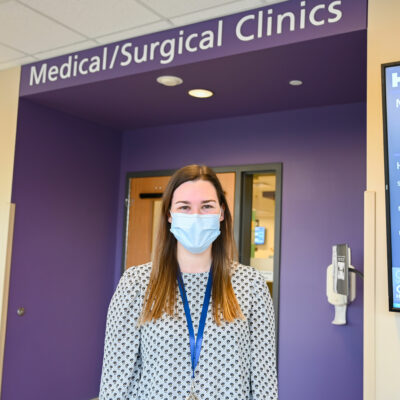 Social Workers:
Social Workers:
Diabetes can affect you, physically and emotionally. We can provide counselling to promote self-care strategies to help cope and manage the illness and stress associated with diabetes. The social worker can also assist with system navigation, including linkages to community programs, resources for medication and financial assistance programs, connections to food programs, community housing and transportation services.
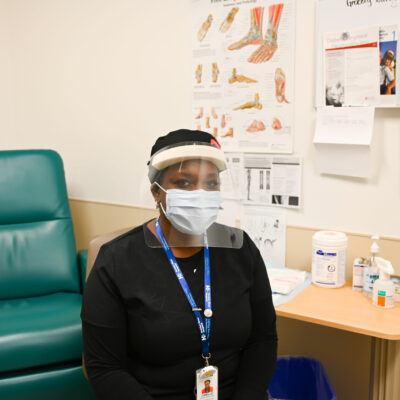 Foot Care:
Foot Care:
Our Nurse-Led Foot Care Clinic provides Diabetes Foot Care education, Diabetic Foot Screening, Basic and advanced foot care: nail trimming, care for calluses, corns, thick nails and ingrown nails that are not infected.
Foot problems are very common in patients and can lead to serious complications. See your doctor or health care professional right away if you have a crack, blister or wound.
A good daily foot care routine may help keep your feet healthy. This routine includes:
- Examine your feet and legs daily
- Care for your nails regularly
- Apply moisturizing lotion if your feet are dry (but not between the toes)
- Wear properly fitting footwear
- Control your blood glucose
Registered Nurses:
We focus on educating patients on their diabetes medication and achieving optimal blood sugar targets. We offer virtual classes for Prediabetes patients, Type 2 Diabetes patients and Gestational Diabetes patients. We also offer insulin teaching in-person (dependent on Covid-19 policy) and via phone calls.
Health Tips
- Be mindful of recurrent infection that does not go away; please check with your Family MD and assess your blood sugar.
- Frequent urination, thirst and fatigue are common signs and symptoms of diabetes. Please speak with Family MD and complete a blood test.
- Yearly physical exams with your family physician will help screen risk factors for diabetes.
- If you have diabetes, please attend your annual eye exam to assess for retinopathy.
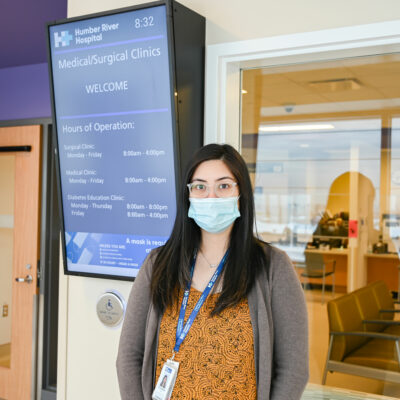 Registered Dietitians:
Registered Dietitians:
Nutrition therapy can help reduce A1C levels by 1.0-2.0% and can further improve other clinical and metabolic outcomes for diabetic patients. The Diabetes Education Centre Registered Dietitians help patients meet their health goals with advice that best aligns with their values and preferences to help achieve sustainable lifestyle changes.
Aside from one-on-one counselling, we offer the following virtual classes: Craving Change, Grocery Store Tours, Prediabetes, Type 2 Diabetes, and Gestational Diabetes management.
Registered Dietitian Tips:
- Try to prepare more of your meals at home and use fresh, unprocessed ingredients.
- Be cautious of following fad diets. The best weight loss strategy is one that you are able to maintain long term. Speak with a Registered Dietitian to discuss what would work for you.
- Follow the balanced plate- ½ of your plate as vegetables, ¼ as protein and ¼ as grain or starch.
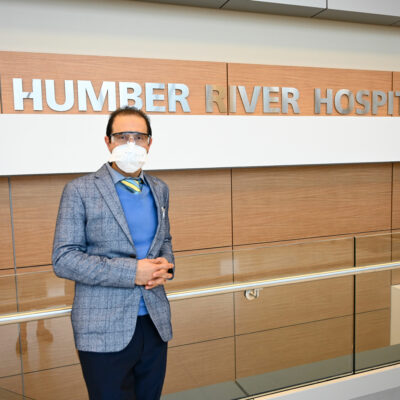 Endocrinologists:
Endocrinologists:
Endocrinologists specialize in treating diabetes with diet modifications and blood sugar, reducing medications such as insulin. We work closely with the patients to control their blood sugar and monitor them to prevent health problems.
In providing our services, we hope that patients and their families can better understand diabetes and manage diabetes better.
To book an appointment with the Diabetes Education Centre, your family doctor can refer you, but self-referrals are welcomed as well!
